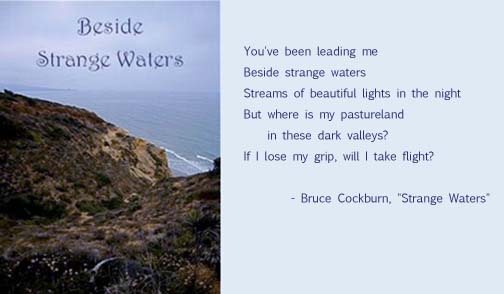In the
SCA, after we go to an event, sometimes we get together and tell, "No s***, I was there!" stories. Well, in the church, sometimes we get to tell, "No kidding, God was there!" stories. (We don't say s*** in church; so we say, "No kidding!" instead.)
This is one of those "No kidding, God was there!" stories.
Yesterday (Saturday): I posted my poor-poor-miserable-me entry about how I've been sitting on the couch and crying, fighting with my husband, and generally wasting my life on computer games. When I went to review my Bible memory verses, I found myself looking at Matt. 7:7,8:
Ask, and it shall be given to you; seek, and you shall find; knock, and it shall be opened to you. For everyone who asks receives, and he who seeks finds, and to him who knocks it will be opened.
I was all like, "Yeah, right, God. I'll believe that when I see it."
Saturday evening, people responded to my sad blog entry with love and kindness. I cried some more, but happier tears this time.
Saturday night: I couldn't sleep. I was awake at one and four and probably in between as well.
Today (Sunday): I sleep through two alarms going off and the dog trying to dig his way into the bed. I sleep so late that, by the time I struggle out of bed and drink some coffee, I have only 15 minutes to dress and get out the door. Somehow, we arrive at church only a few minutes late. This is a miracle in and of itself.
We walk in after the service starts, and there's this guest preacher from Tucson named Brian. He begins by saying, "I know you're in the middle of a sermon series on Acts, but I really wanted to tell my life story. So I phoned Pastor Jesse and he said, 'Sure, if it's that important, preach on whatever you want.'"
At this point, I stop playing with my iPhone and start actually listening because I KNOW that if God got me out of bed, got me off the couch, brought a guest speaker from Tucson, and interrupted a sermon series, He has something important to say. Here's what it was:
When Pastor Brian was a teenager, he had an encounter with God where he felt God telling him, "You are Mine forever and You will serve Me." At the time, Brian was a gifted baseball player with college scholarships waiting for him, so he had no plans to enter the ministry - until a freak motorcycle accident sent a clutch handle through his leg and ended his dream of a career as a professional athlete.
In the hospital, as Brian waited for his parents, God showed him Prov. 3:5,6:
Trust in the Lord with all your heart
And do not lean on your own understanding.
In all your ways acknowledge Him,
And He will make your paths straight.
Brian said that the message from God was, "
Trust Me, lean on Me."
As he continued his story, incident after incident proved to Brian that, no matter what the circumstances in your life are, no matter how confusing things appear, you can trust God and lean on Him. Whether it was becoming a youth pastor in New Mexico or moving back to Arizona so he could meet his future wife, over and over again, the message remained, "
Trust Me, lean on Me."
As I reflected on Brian's story, I realized that, no matter what my life's hopes and dreams were, God can still take my life in unexpected directions, and it's okay. Brian wanted to be an athlete, but when an injury ended that dream, his life didn't end. God took him someplace else, and hey, it turned out to be a good place. God can definitely do that for me, and for every one of us - if we're willing to trust Him and lean on Him.
During the service, someone (Brian?) said, "God said He will make your path straight. Straight. Not crooked, not falling into a ditch, not ending up in the bottom of a pit. God said he will make your path straight."
Trust Me, lean on Me.
The other thing that God said to me during church was, "Don't treat your
husband like he was dead. He's not dead; he's broken. Instead of
grieving for what might have been, have compassion." We cannot change
the past, and because of my husband's severe chronic pain, we are
definitely going to have trials in our future.
I'm not sure where we're going, but I know that it's going to be okay.
* * * * *
Thank you all for listening, and being there for me :-)
















